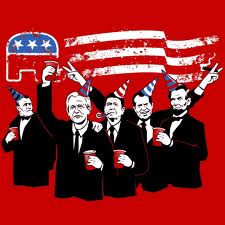 What has happened to the Republican Party? In 1960, Jackie Robinson was a Republican and President Eisenhower, like Teddy Roosevelt before him, was still able to claim that he was the leader of, “the party of Abraham Lincoln.” Ike was probably the last Republican president who could believably say that he belonged to the party of Lincoln. The purpose of this multi-part article is to lay out a few historical developments of the Republican Party and how it became a party of “warped principles.”
What has happened to the Republican Party? In 1960, Jackie Robinson was a Republican and President Eisenhower, like Teddy Roosevelt before him, was still able to claim that he was the leader of, “the party of Abraham Lincoln.” Ike was probably the last Republican president who could believably say that he belonged to the party of Lincoln. The purpose of this multi-part article is to lay out a few historical developments of the Republican Party and how it became a party of “warped principles.”
After losing in 1960, Richard Nixon won the presidency in 1968 due in part to his “Southern Strategy” intended to capture the white racist vote that had been a mainstay of the Democratic Party since before the Civil War. In 1968, those votes were available since President Lyndon B. Johnson rejected everything that President Andrew Johnson stood for by signing into law the Civil Rights Acts of 1964 and 1965. “We have lost the South for a generation,” LBJ said. He was right.
The 1960s completed the strange setback of the two political parties. The “radical” Republicans brought about a second American revolution with the 13th, 14th and 15th Amendments to the Constitution. These Republicans were dedicated to a strong, large federal government, to public education and to expanded voting rights. But, a century later, Republicans became adamantly opposed to all of those things.
In today’s climate, especially under President Obama, Republicans are railing against public schools, calling for voting restrictions, a smaller and weaker federal government, and assaulting women’s health rights. If you hear a politician attacking due process or citizenship for all born here, or equal protection for all including gays and lesbians, you know that this politician belongs to the party that bears the same name as the party that fought to protect all those things in the Constitution. Basically, the GOP traded Lincoln to the Democrats for Strom Thurmond, Ronald Reagan and the Tea Party.
Republicans initially became strongly identified as the party of Lincoln, the party that freed the slaves and the party that won the war. As a result, few Southerners joined the Republicans for over a hundred years probably because the memory of losing the war provided a strong impetus to remain a Democrat. During their approximately 60 years in power, Republicans became synonymous with laissez-faire economics which held that few regulations and non-interference with business practices ensured a healthy economy for all.
At the end of World War II, America took another turn with Republicans by electing General Dwight Eisenhower President in 1952, and gave control of the Congress back to the Republicans as well. At a time when they might have been expected to be at their strongest, in-fighting destroyed the sense of peacefulness the GOP might have enjoyed. Senator Joseph McCarthy, despite alienating many with his anti-Communist tirade, won over some members of the Party and obtained new followers especially among Catholics who were previous strong Democrats. The New Right was greatly disappointed in President Eisenhower because he had not reversed the New Deal that had been Roosevelt’s hallmark, and neither had he completely defeated Communism (intervention in foreign affairs was now held as a virtue by the Party). In addition, Eisenhower’s support of the Brown v. Board of Education decision in 1954, permitting black students to attend white schools angered many that saw ‘separate but equal’ as good because it was what had always been.
With conflict came the re-election of the Democrats with John F. Kennedy and Lyndon B. Johnson taking the presidency. Richard Nixon’s election in 1968 was not so much a support of Republican ideas as it was the hope that he could end the war in Vietnam. Nixon’s resignation from the office, in disgrace, damaged the Republican Party more than his progress in ending the war had helped it. America once again turned to the Democrats by electing Jimmy Carter in 1976. Carter’s apparent failure in foreign affairs together with a recession at home, led to the election of Ronald Reagan in 1980.
Reagan embodied many qualities that the New Right splinter group of the GOP admired, e.g., strongly anti-Communist, willingness to intervene in foreign disputes, and economic policies that effectively rendered invalid the remnant of the New Deal. Additionally, the Reagan administration was committed to opposing what they perceived as overly liberal steps taken by the courts in the direction of abortion, civil rights, and school prayer. The economic boom of the 1980s helped Reagan’s re-election and in 1988 for George Bush; however, when the economy entered a downturn in the early 90s, this was seen as an indication of a failure of the GOP economic policies and led to the election of Democrat Bill Clinton in 1992. Ironically, the other factor that appeared to hurt the Republicans was the ending of the Soviet Union; anti-Communist rhetoric lost its appeal when the Communists became capitalists.
CONTINUED IN PART II
This is very attention-grabbing, You’re an overly professional blogger. I have joined your rss feed and sit up for in search of extra of your magnificent post. Also, I’ve shared your website in my social networks